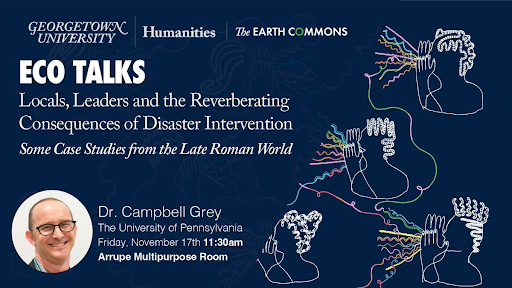Campbell Grey, “Locals, Leaders and the Reverberating Consequences of Disaster Intervention. Some Case Studies from the Late Roman World”
Organized by Dr. David Pickel (ACLS Postdoctoral Fellow at Georgetown Humanities) and co-sponsored by The Earth Commons and the Georgetown Humanities Initiative.

This talk by Prof. Campbell Grey (Department of Classical Studies and Penn Program in Environmental Humanities, University of Pennsylvania) engaged with recent scholarship in the field of Disaster Risk Reduction and Management, which has noted the collections of small-scale disasters that characterize the daily existence of the disempowered and marginalized, and explores the interactions between those everyday experiences of precarity and more widespread, momentary disasters. In such circumstances, any intervention from outsiders will be an expression of power with unintended, reverberating consequences. Prof. Gray’s talk explored these propositions, focusing upon some anecdotes from the late Roman world: the conflictual and mutually contradictory interventions of the fourth-century Caesar Gallus in a grain shortage at Antioch; the experiences of the inhabitants of Nicomedia following a catastrophic earthquake in 358 CE; the response of the third-century king Agbar to a devastating and unseasonable flood in his home city of Edessa.
Prof. Campbell Grey is a social, economic, and environmental historian of the Roman world. His research explores notions of risk and uncertainty, primarily in the lived experiences of voiceless and marginalized populations. Dr. Grey’s current book project, Living with Risk in the Late Roman World, places data and methodologies from the earth and environmental sciences alongside textual evidence from the fourth through sixth centuries to explore lived experiences and cultural vocabularies of risk in the late Roman period.